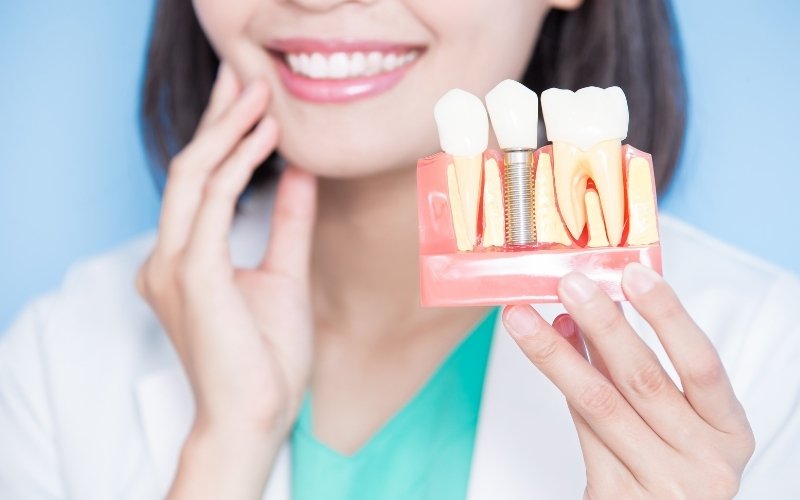4765 Carmel Mountain Rd., Suite 203, San Diego, CA 92130
Dental Implants for Seniors: What You Need to Know?

Dental Implants for Seniors: What You Need to Know?
Dental health plays a crucial role in overall well-being, especially for seniors. As we age, tooth loss can become a common issue, affecting eating, speaking, and self-esteem. Dental implants offer a permanent solution for missing teeth, allowing seniors to enjoy an improved quality of life.
This blog will explore dental implants, their benefits, and important considerations for seniors. It aims to provide you with the information you need to make informed decisions about dental implants.
What Are Dental Implants?
Dental implants are artificial tooth roots made of titanium. They provide a strong foundation for replacement teeth. An implant consists of three main components: the implant itself, an abutment, and a crown.
The implant is surgically placed into the jawbone, where it fuses with the bone over time through a process called osseointegration. The abutment connects the implant to the crown, which is the visible part of the tooth.
There are two primary types of dental implants: endosteal and subperiosteal. Endosteal implants are placed directly into the jawbone. They are the most common type and are suitable for most patients.
Subperiosteal implants are placed under the gum but above the jawbone. This type is often used for patients who do not have enough jawbone height or cannot undergo bone augmentation.
Each type has its advantages, depending on individual needs.
Why Dental Implants?
Dental implants provide numerous benefits, especially for seniors. One significant advantage is improved oral health. They prevent the shifting of adjacent teeth and reduce the risk of gum disease. Another key benefit is enhanced chewing ability. With dental implants, seniors can enjoy their favorite foods without discomfort.
Dental implants also have notable aesthetic benefits. They look and feel like natural teeth, helping restore confidence in one’s smile. Furthermore, they help preserve the jawbone and facial structure. Missing teeth can lead to bone loss and changes in facial appearance. Dental implants stimulate the jawbone, preventing these changes.
Additionally, dental implants offer a long-term solution compared to dentures. While dentures may need frequent adjustments or replacements, implants can last a lifetime with proper care. This durability makes them a worthwhile investment for seniors looking to improve their dental health and overall quality of life.
Who Is a Candidate for Dental Implants?
Most seniors can be good candidates for dental implants in San Diego, but several factors influence eligibility. Age is a consideration; older adults can successfully undergo the procedure if they are healthy. Additionally, overall health plays a crucial role. Conditions like diabetes or osteoporosis can affect healing and implant success, so managing these conditions is important.
Bone density is another critical factor. Seniors with sufficient jawbone density are ideal candidates. If bone density is low, options like bone grafting may be necessary. A dental professional can assess the condition of the jawbone through imaging and physical examinations.
Consulting with a dental professional is essential before deciding on dental implants. They can evaluate individual health conditions and recommend the best course of action. A thorough assessment helps determine the most suitable treatment plan, ensuring the best chances for a successful outcome.
The Dental Implant Process
Getting implants involves several key steps. The process starts with an initial consultation and evaluation. During this visit, the dentist assesses overall health, oral health, and bone density. They will also take X-rays and other imaging to plan the procedure.
Next is imaging and treatment planning. The dentist uses the images to create a personalized plan. This plan outlines the type and number of implants needed.
The third step is the implant placement procedure. This surgical process involves inserting the titanium implant into the jawbone. Local anesthesia ensures comfort during the surgery. After placement, the healing period begins. This phase, known as osseointegration, can take several months. The implant fuses with the jawbone, creating a stable foundation.
Once healing is complete, the dentist will place the crown. This final step involves attaching a custom-made crown to the abutment. Seniors can expect a comfortable and natural-looking result after this process. Throughout the stages, regular follow-up appointments help monitor healing and address any concerns.
Aftercare and Maintenance
Caring for implants is essential for their longevity. Oral hygiene practices play a vital role in maintaining implants. Seniors should brush their teeth twice daily and floss regularly. Using an antibacterial mouthwash can help reduce plaque buildup.
Regular dental check-ups are also crucial. Visiting the dentist every six months allows for professional cleaning and monitoring of the implants. These visits can catch any potential issues early, ensuring long-term success.
Lifestyle considerations are important, too. A balanced diet supports oral health while avoiding tobacco products can prevent complications. Tobacco use can hinder healing and increase the risk of implant failure. By following these aftercare tips, seniors can enjoy their dental implants for years to come.
In summary, dental implants offer significant benefits for seniors, including improved oral health and aesthetics. They provide a long-lasting solution for missing teeth and enhance overall quality of life.
If you are considering dental implants, consult with our dental professionals for personalized advice. We can help you understand the process and determine the best options. Investing in dental implants can lead to a brighter smile and better health in your golden years.
